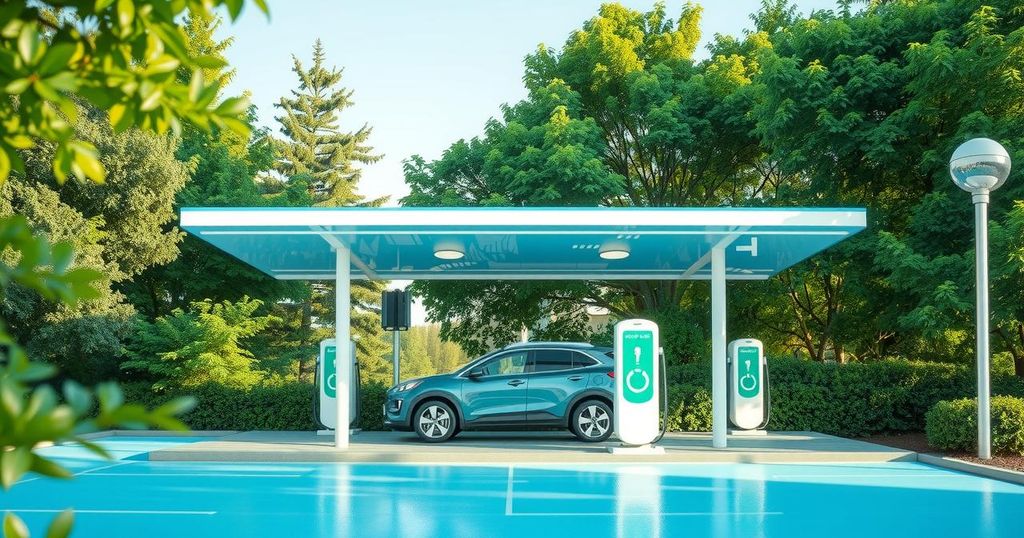Rwanda Launches Rwf1.2 Billion Carbon Market Project to Promote Electric Vehicles
Rwanda has launched a Rwf1.2 billion carbon market project to boost electric vehicle adoption. Funded by GGGI and in collaboration with REMA, the initiative aims to build awareness and capacity across sectors while providing financial incentives for emissions reduction. The project is essential for attracting private investment towards sustainable development and aims for comprehensive EV adoption by 2030, requiring substantial financing.
Rwanda’s government has introduced a Rwf1.2 billion carbon market project aimed at fostering awareness and expertise among public and private stakeholders, with the overarching goal of increasing electric vehicle (EV) adoption. The initiative, known as the Rwanda Article 6 Readiness and Carbon Market Framework Operationalisation, is financed by the Global Green Growth Institute (GGGI) and will be carried out in partnership with the Rwanda Environment Management Authority (REMA) over a two-year span.
This project intends to deliver technical support for developing high-quality carbon reduction initiatives across diverse sectors such as agriculture, forestry, energy, transport, and waste management. REMA has acknowledged that renewable energy projects, particularly the expansion of electric vehicles, hold significant potential in the carbon market, thus providing investment opportunities for capacity building in project design.
The carbon market allows for the trading of carbon credits, each representing one tonne of reduced carbon emissions. This system provides a mechanism for businesses to offset their emissions by financing reduction initiatives in other countries, thereby aiding them in meeting climate targets. By 2030, Rwanda anticipates that the comprehensive adoption of electric vehicles and necessary infrastructure will necessitate financing of up to $900 million, with potential financial incentives for investors based on emissions reductions.
The establishment of a carbon market is considered a pivotal step to promote private sector involvement in creating a carbon-neutral economy. Srinivas Cheruvu, Managing Director of CFAO Mobility Rwanda, underscored the environmental benefits of electric vehicles, contrasting them with fossil fuel-powered vehicles, which have exacerbated pollution.
Cheruvu noted the appeal of EVs for corporate fleets due to their cost-effectiveness and efficiency, citing the BYD Dolphin electric car, which can traverse significant distances at a lower recharging cost compared to fuel alternatives. Furthermore, he pointed out that Rwanda’s dedication to green growth policies favors substantial market potential for electric vehicles.
In terms of tax incentives, Cheruvu conveyed that the government’s tax exemption policy would significantly advance EV adoption. Nevertheless, electrical vehicle operators expressed concerns over lengthy charging times attributed to the deficiency of public charging stations. Teddy Mugabo, CEO of the Rwanda Green Fund, stated that the fund is supporting various e-mobility firms to enhance the EV infrastructure, including charging stations.
Faustin Munyazikwiye, Deputy Director General of REMA, reiterated the importance of electric vehicles in Rwanda’s carbon market strategy. He mentioned existing partnerships with Singapore and Sweden to advance project design and capacity building, critical for mobilizing financial resources for renewable energy initiatives. Also, Rwanda’s agreements with these countries aim to facilitate carbon credit trading under Article 6 of the Paris Agreement, enhancing efforts to meet climate targets by 2030.
At the upcoming COP28 in Dubai, Rwanda is expected to present its National Carbon Market Framework, which outlines strategies for utilizing market-oriented mechanisms to diminish greenhouse gas emissions. Despite facing initial challenges such as gaps in awareness and capacity, REMA strives to enhance the carbon market’s transparency and functionality to attract international investments and foster sustainable development.
Caroline Raes, GGGI Country Representative in Rwanda, emphasized the need for equitable participation in carbon markets as a means to drive funding for emissions reduction initiatives. By improving Rwanda’s position for international carbon markets, the country can unlock critical financial resources and accelerate efforts toward climate action and green technology transfer.
In conclusion, Rwanda’s Rwf1.2 billion carbon market initiative seeks to significantly promote the uptake of electric vehicles through enhanced awareness and capacity building. The support of organizations like the GGGI and partnerships with global entities are pivotal in mobilizing climate finance and fostering sustainable development. Despite the challenges of limited infrastructure and awareness, the government’s commitment to EV adoption through various incentives positions Rwanda favorably in the quest for a carbon-neutral economy.
Original Source: www.newtimes.co.rw




Post Comment